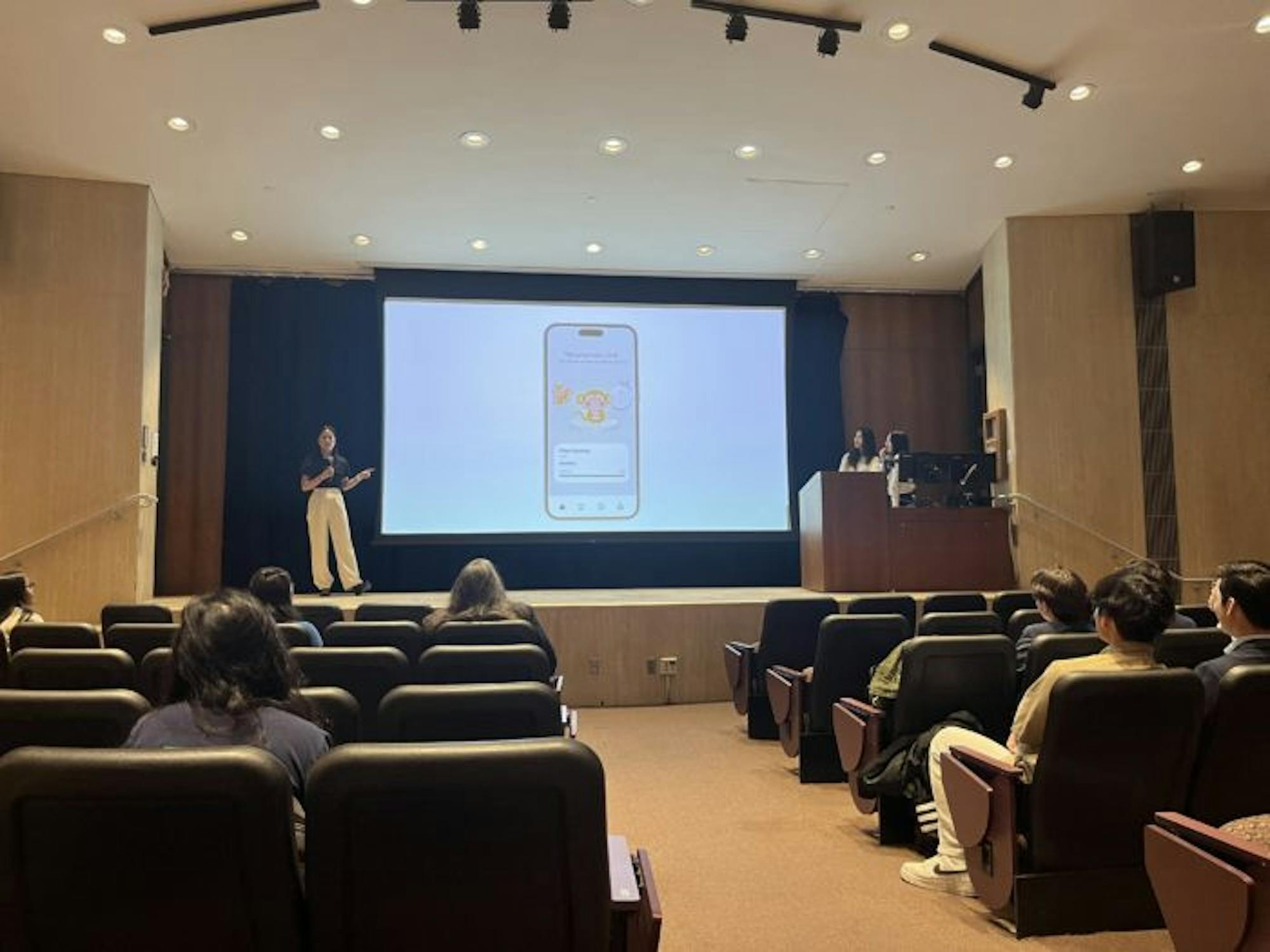As the workweek came to close last Friday, 14 teams of undergraduate developers settled into Hesburgh Library for the annual hackathon, a social coding competition over 40 hours long.
This year’s theme, “Hacking for Harmony,” prompted computer programmers and graphic designers to devise ideas that leverage technology like artificial intelligence to create harmony at Notre Dame or around the world.

For a chance at the $3,000 first-place prize, teams of two to four students built apps or websites for everything from connecting gym buddies to facilitating a reimagined campus’s Sales and Giveaways GroupMe.
The ideas were judged by a panel of University tech scholars Sunday afternoon during a series of four-minute lightning talks in Carey Auditorium.
A trio of senior computer science majors, Carlo Preciado, Gavin Uhran and Kristen Friday, developed a smartphone application using generative AI called “On Campus” to transform the way students find events they’re interested in.
During On Campus’ lightning talk, Preciado jumped into the app demonstration.
“Right away, you’re going to see an ordered list, chronologically, of … events happening this week and events that are upcoming as well,” Preciado said. “That revolution that I talked about actually happens in the suggestions tab [where] we’re using generative AI.”
Preciado said that when a user clicks on his or her On Campus profile, they can add interest data like “live music” or “concerts.”
"Once you enter the suggested tab again, you’re going to go ahead and see a populated list of things that this AI thinks would interest you,” Preciado said. “You get to see some more descriptions about [events] and maybe an RSVP link.”
Uhran explained that the group used natural language processing, machine learning and prompt engineering to optimize the life of Notre Dame students.
Friday added how the app addresses the information “overflow” students face, which often results in missing out on important or fun events.
“We’re leveraging that generative AI technology to create a simplified and customized and tailored experience to every single user,” Friday said. “Also, it unifies and creates harmony for publishers of events.”
On Campus earned the third-place prize in the competition. The creators of Bite Bud, an app that promotes healthy eating habits, finished second. Tribe ND, the team that created a centralized marketplace for miscellaneous campus transactions, took first.
Since 2016, hackathon co-chairs Randy Harrison and Julie Vecchio have been running the Hesburgh Library event — taking 2020 off due to the pandemic.
But this year, Harrison and Vecchio had to account for a whole new complication: ChatGPT.
“One thing that ChatGPT does represent to us as a challenge is that it can give you sometimes pretty whole cloth solutions to certain things,” Harrison said. “What it won’t do is write an app that does harmony … and put out this whole thing that’s going to totally work together.”
Although the hackathon did ask competitors not to use ChatGPT, Harrison said it wasn’t something he was worried about, as it’s already common for students to look up coding solutions on websites such as Stack Overflow.
“[ChatGPT] works in chunks … a couple functions will work together,” Harrison said. “[Computer science] professors use it all the time. But don’t just go into [ChatGPT], copy a bunch of code and paste into your thing without understanding how it works.”
As to why students at the University might elect to spend an entire weekend working inside the library, Harrison said computer science majors like the challenge.
“There’s a lot of people who instead of going out drinking, they do gaming or whatever,” Harrison said. “I think there’s definitely a space and a niche for the people who want to do these kinds of [events]. And of course, even if you’re like, ‘this isn’t the funnest thing in the world,’ I think some students probably recognize the value of this on your resume.”
Vecchio said wandering around and seeing what teams come up with over the course of the weekend is her favorite part of her job.
“You’re hanging out in the library,” Vecchio said. “The building is beautiful. The resources are amazing here.”













